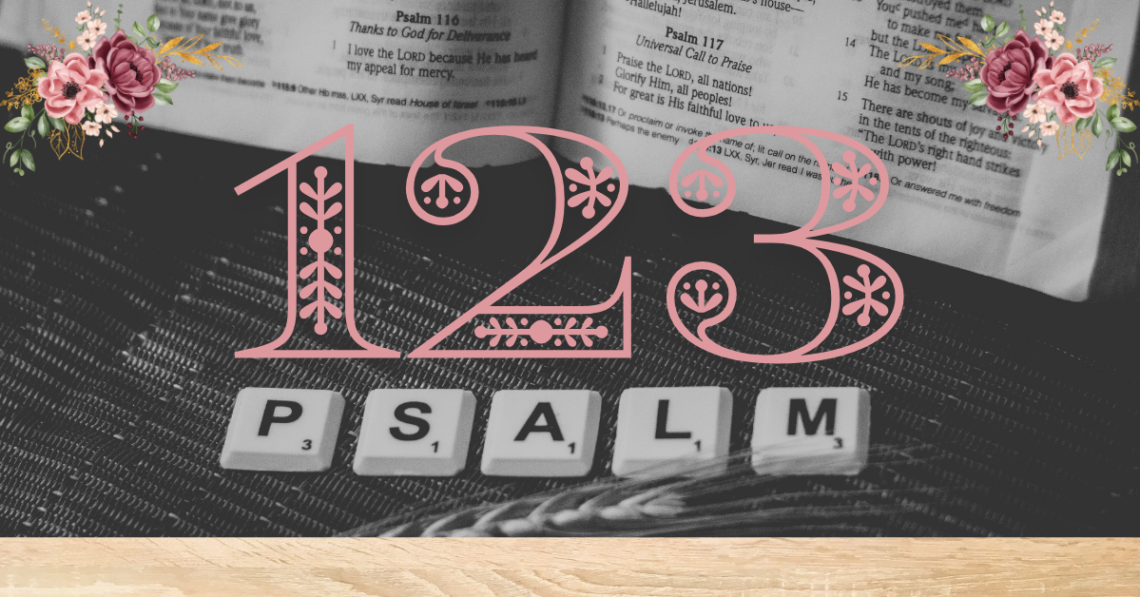Psalm 123 is another of the Psalms of Ascents, a short but powerful prayer expressing dependence on God. It reflects the heart of a servant looking to their master with complete trust, waiting for relief from contempt and opposition. This psalm is often seen as a communal prayer, asking God for mercy in the face of persistent mockery and oppression. It reminds believers to lift their eyes to the Lord for help and to patiently rely on His mercy.
Background of Psalm 123
Psalm 123, though only four verses long, is rich in imagery and meaning. As part of the pilgrim songs, it likely would have been sung by travelers on their way to Jerusalem. Its author is not named, but the tone suggests a people facing adversity. This psalm captures the humble posture of a servant awaiting instruction or relief from a master. It’s an expression of complete dependence on God in a time of trouble, and a plea for His mercy amidst scorn from the proud and arrogant.
What Does Psalm 123 Mean?
Psalm 123 is a call to God for mercy. The psalmist begins by lifting their eyes to God, acknowledging His position in heaven and their own role as humble servants. The psalm contrasts the steadfast attention of a servant to their master with the constant hope believers place in the Lord. The psalm ends with a plea for mercy, specifically because of the scorn and contempt they’ve endured. This psalm reminds us that when we are mistreated or feel overwhelmed by the world, we can—and should—look to God for mercy and deliverance.
Verse Mapping Psalm 123:1
“I lift my eyes to you, the one enthroned in heaven.” (CSB)
Word Study
- Lift my eyes – A posture of prayer and dependence, often symbolizing trust and humility before God.
- Enthroned – The Hebrew word “yashab,” meaning to sit or dwell. In this context, it signifies God’s sovereign reign.
- Heaven – Represents God’s authority, majesty, and position above all earthly power.
Cross-References
- Psalm 121:1 – “I lift my eyes toward the mountains. Where will my help come from?”
- Isaiah 6:1 – “I saw the Lord seated on a high and lofty throne, and the hem of His robe filled the temple.”
- Hebrews 12:2 – “Keeping our eyes on Jesus, the pioneer and perfecter of our faith.”
Paraphrase
I lift my eyes in prayer to You, the One who rules from Your throne in heaven.
Application
In moments of need or discouragement, where do you turn your eyes? This verse reminds us to look up—to fix our gaze on the One who rules with power, mercy, and wisdom. When life feels overwhelming, lifting our eyes to God helps reorient our hearts to His presence and authority.
Verse Mapping Psalm 123:2
“Like a servant’s eyes on his master’s hand, like a servant girl’s eyes on her mistress’s hand, so our eyes are on the Lord our God until he shows us favor.” (CSB)
Word Study
- Servant’s eyes – Reflects attention, dependence, and obedience.
- Hand – Symbolizes power, provision, and instruction.
- Favor – The Hebrew word “chanan,” meaning grace, compassion, or mercy.
Cross-References
- Exodus 14:14 – “The Lord will fight for you, and you must be quiet.”
- Lamentations 3:25 – “The Lord is good to those who wait for Him, to the person who seeks Him.”
- James 4:10 – “Humble yourselves before the Lord, and He will exalt you.”
Paraphrase
Just as servants carefully watch their master’s hand, we fix our eyes on the Lord, waiting for His mercy.
Application
This verse paints a picture of patient and humble dependence. Like servants who wait for their master’s command or provision, we are called to watch and wait for the Lord’s direction and mercy. Are you in a season of waiting? How can you remain attentive to God’s presence as you trust Him for the next step?
Verse Mapping Psalm 123:3
“Show us favor, Lord, show us favor, for we’ve had more than enough contempt.” (CSB)
Word Study
- Show us favor – A repeated plea for mercy and grace, emphasizing urgency and need.
- Contempt – Deep disrespect, mockery, or derision.
Cross-References
- Psalm 86:15 – “But you, Lord, are a compassionate and gracious God…”
- Hebrews 4:16 – “Let us then approach the throne of grace with boldness…”
- 1 Peter 5:10 – “The God of all grace… will Himself restore, establish, strengthen, and support you…”
Paraphrase
Please be gracious to us, Lord—we are worn down by constant disrespect and ridicule.
Application
There are times when life’s challenges seem relentless. The psalmist boldly asks for God’s mercy, modeling a raw and honest prayer. Have you been mocked, discouraged, or worn out by the attitudes of others? God invites you to come to Him and ask boldly for favor and comfort.
Verse Mapping Psalm 123:4
“We’ve had more than enough scorn from the arrogant and contempt from the proud.” (CSB)
Word Study
- Scorn – Open disrespect, ridicule, or mockery.
- Arrogant/Proud – Those who elevate themselves above others and often stand in opposition to God’s ways.
Cross-References
- Proverbs 3:34 – “He mocks those who mock but gives grace to the humble.”
- Isaiah 2:11 – “Human pride will be humbled, and the loftiness of men will be brought low; the Lord alone will be exalted on that day.”
- James 4:6 – “God resists the proud but gives grace to the humble.”
Paraphrase
We’ve endured enough ridicule from the proud and arrogant people around us.
Application
The world can be harsh, especially toward those who humbly walk in faith. This verse validates the feeling of exhaustion from being misunderstood or mistreated. How can you continue to look to God in the face of ridicule or opposition? Take comfort in knowing He sees, He cares, and He will respond in mercy.
How Can We Apply Psalm 123 Today?
Keep Your Eyes on the Lord
Psalm 123 teaches us to look up and fix our gaze on God, especially when we feel helpless. In our fast-paced world full of distractions, intentionally lifting our eyes to the Lord brings peace and direction.
Trust God’s Timing for Mercy
The psalm reflects a patient posture, waiting for God’s favor. Even when mocked or mistreated, we’re encouraged to trust that God sees and will respond with grace.
Pray Boldly in Difficult Seasons
Whether you’re experiencing personal attacks, spiritual fatigue, or just the weight of the world, Psalm 123 reminds us that it’s okay to cry out for help. God welcomes our prayers and is faithful to respond.
Reflection Questions
- Where do you turn your attention when you feel overwhelmed?
- What does it look like for you to wait on the Lord with the posture of a servant?
- Have you asked God for mercy in your current season? How can you bring your honest needs to Him?
A Closing Prayer
Lord, we lift our eyes to You. You are enthroned in heaven, full of mercy and compassion. In our weariness, help us to wait on You with patience and faith. Show us favor, Lord. Strengthen our hearts when we face ridicule or rejection. Let us keep our eyes on You and trust in Your perfect timing. Amen.
Final Thoughts
Psalm 123 is a short yet powerful reminder of where our help and hope come from. It calls us to look upward in dependence and to trust that God’s mercy is worth waiting for, especially when the world looks down on us.





